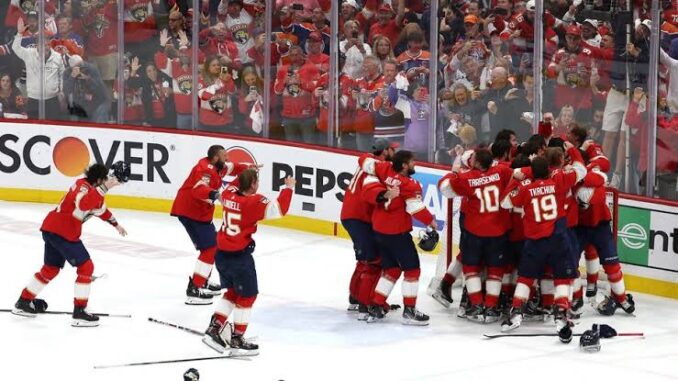
One of the big talking points around the NHL the past couple of years has been about how teams in non-income tax states — like the Florida Panthers, Tampa Bay Lightning, and Vegas Golden Knights — have a big advantage over teams located in states or provinces with high tax rates.
Do they?
Well, yeah.
On Tuesday, NHL Deputy Commissioner Bill Daly broached the subject during the NHL/NHLPA Media Tour in Las Vegas said changes could come to the league’s salary cap to try and even things out — but not anytime soon.
“There are just too many variables to really control all of them,” Daly said according to the Canadian Press.
“If we have the next ten years similar to the last five, then maybe it’s something that needs to be addressed. But at this stage, I’m not really running to get there. … We always look for ways to make the system better. I don’t have any obvious answers to it.”
Florida’s Sam Reinhart was at the Media Tour and was asked if Florida not having a state income tax played a role in his re-signing with the Panthers earlier this summer.
Reinhart, who scored a career-high 57 goals going into his free agency year, signed for what a team-favorable deal of eight years at $8.65 million.
Toronto’s William Nylander, meanwhile, has his new eight-year contract kicking in this season. He is going to be count $11.5 million against the salary cap.
Nylander’s contract would make him the highest paid player with the Panthers — by a sizable margin.
Both Sasha Barkov and Sergei Bobrovsky make $10 million annually; Matthew Tkachuk counts for $9.5 million.
Although the Panthers pay their top players a little less, that only works if players want to be there.
Lately, everyone seems to want to play for the Panthers.
That was not always the case.
Remember, the Panthers had always played in a state without an income tax — and people are only complaining about it now that they are winning.
“It is something that comes up,” Reinhart said when asked about the lack of Florida state tax.
“It’s things you balance. It just so happens that it’s tax-free, and one of the better places to play. Those are all factors.’’
There are a handful of teams which play in states without local income tax, with the Florida and Nevada teams winning four of the past five Stanley Cup championships.
Canada, which has teams whose players pay both a federal and provincial tax, has not had one of its NHL teams win the Stanley Cup since 1993.
When Florida beat the Edmonton Oilers, much was made of how much more the Oilers were paying their top stars than the Panthers are.
Edmonton recently signed Leon Draisaitl to an eight-year contract worth $14 million each year.
Connor McDavid, if he stays in Edmonton, will likely eclipse that with his next contract.
Meanwhile, the Panthers core is pretty much locked down at affordable deals with Carter Verhaeghe, Sam Bennett, and Aaron Ekblad going into the final year of their contracts.
“They have to find a way to tweak it,” Ottawa’s Shane Pinto said. “If you look at all these free agents, you don’t blame them for going down south. But I do think they have to find a way, especially for the Canadian teams … they’ve got to overpay guys to come to Canada every time, that messes up with the cap.
“It’d be nice to have an even playing field.”
Radko Gudas, who left the Panthers to sign a three-year contract with Anaheim last summer, seems to get a kick out of this argument.
While Florida does not have a state income tax which has positively affected the Panthers and Lightning over the years, smart roster building and team development builds winners — and that does not have anything to do with taxes or a lack of them.
“I don’t think the NHL should be stepping into tax problems,” Gudas said per the CP.
“If they want to change it, maybe we should change the playoff format, too.”



Be the first to comment